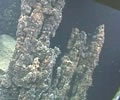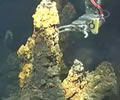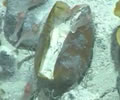| 2006
Videos: Ocean Explorer Return to the Mariana Arc The edited video clips show highlights from East Diamante dives with the JASON II remotely operated vehicle. These movies are larger format versions (480 x 360) of the video clips available on the NOAA Ocean Exploration web site, along with images and logs from the expedition.
|
||
| NW Eifuku | ||
 |
Champagne
vent at NW Eifuku was discovered in 2004 and was found to be venting
gas-rich hydrothermal fluid and droplets of liquid CO2 from the seafloor.
In 2006, Champagne vent is still active and we are now studying the
effects of the high levels of CO2 on the surrounding colonies of chemosynthetic
mussels. Quicktime: 12.8 MB | Windows Media 5.3 MB |
|
 |
In addition to the dense colonies of mussels at NW Eifuku, there are
also the same two species of shrimp that we found at NW Rota-1 (the
volcano we found to be actively erupting). However, at NW Eifuku the
two shrimp species live in different habitats separated from one another,
whereas at NW Rota-1 they are found together. Quicktime: 16.9 MB | Windows Media 6.5 MB |
|
 |
Even
though there are huge numbers of mussels living around the hydrothermal
vents at NW Eifuku, we hardly ever find any dead shells which is very
unusual. We suspect that the high levels of CO2 being released from
the volcano increase the acidity of the water and after a mussel dies
its shell is quickly dissolved. Documenting this process at NW Eifuku
may help us understand the potential impacts of increased CO2 levels
in the marine environment caused by human activities. Quicktime: 24.2 MB | Windows Media 9.4 MB |
|
